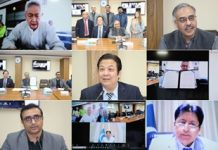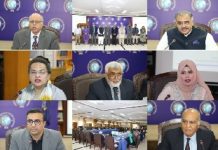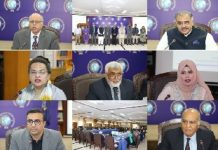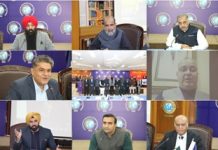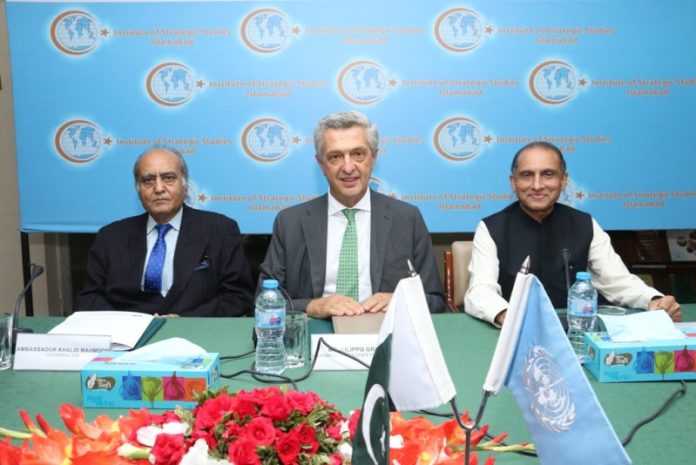PRESS RELEASE
Public Talk
on
“Afghan Refugee Situation: Contextualizing the Role of Pakistan and UNHCR”
Institute of Strategic Studies Islamabad
September 7, 2018
“In a world of closed borders, where xenophobia is rising and rich countries are turning away migrants and refugees, Pakistan is an extraordinary example. In this regard, it is paramount to highlight that besides the extraordinary solidarity exhibited by Pakistan in the last 40 years, it is equally important to identify how this solidarity has contributed to regional stability.” This was stated by Mr. Filippo Grandi, UN High Commissioner for Refugees, during his address at a Public Talk on “Afghan Refugee Situation: Contextualizing the Role of Pakistan and UNHCR”, organized by the Institute of Strategic Studies Islamabad (ISSI) today under its Distinguished Lecture Series.
Mr. Grandi stated that the contemporary world is one of multiple challenges and the situation is becoming increasingly complicated in terms of human consequences. 68.5 million refugees are displaced around the world – out of them 25 million of them are registered Afghan refugees. The Afghan refugee problem is a big part of the world displacement problem today making it one of the most protracted issues. However, protracted should not mean forgotten, he said.
The High Commissioner raised concerns about Afghanistan’s security situation and the lack of ability by the Afghan Government to implement policies. Weak implementation have resulted in poverty, unemployment, now compounded by drought. However, recently the policy making is becoming stronger and filtering down into legislative work. Another positive sign is Afghanistan’s increased dialogue with its neighbors because this means that many issues which were previously confined often to public statements can now be discussed constructively on forums. In a world stage that is becoming very problematic, countries such as Pakistan that showcase solidarity and are an asylum for refugee in times of war are very much needed, he stated. He highlighted two points: Firstly, contrary to popular perception, UNHCR has tried in the spaces allowed to it to focus on solutions – the most desirable solution is of course successful repatriation. Secondly, UNHCR has tried to mobilize international resources to help communities hosting the refugees, particularly in border areas – 10 million people have benefitted from this initiative. In terms of moving forward, Mr. Grandi stated that refugees are an international responsibility which should be shared. He said that the UNHCR has a solution strategy for Afghan refugees in place meant to reinforce sustainable conditions for voluntary return. All stakeholders must strategically move towards a vision of a region where Afghans can move in a controlled manner as any other population, and become an asset for neighboring countries and for Afghanistan itself.
Earlier, in his welcome remarks, Director General ISSI, Ambassador Aizaz Ahmad Chaudhry said that Pakistan has been home to the largest protracted refugee population in the world. 95 per cent of Afghan refugees are residing in Iran and Pakistan. While on one hand, Pakistanis are proud that they opened their homes to Afghan refugees in their hour of need – at huge cost to their economy -, on the other hand, Pakistan continues to receive hostile rhetoric from across the border. Pakistan knows it cannot be very secure until Afghanistan is peaceful. This can only be attained with an Afghan-led and Afghan-owned comprehensive political solution. Ambassador Aizaz went on to highlight two essential elements: border management to ensure terrorist elements do not return to Pakistan; and measures to ensure that concrete repatriation efforts take place. Giving the Afghan refugees ownership to their lands with simultaneous investments by the international community can be important steps in this regard, he said.
Chairman BOG ISSI, Ambassador Khalid Mahmood, in his concluding remarks said that refugee presence has created certain problems for Pakistan in terms of the scourge of terrorism, drug trafficking and arms smuggling. What is needed is to find ways and means to repatriate them. This is the best solution. For this, conducive conditions are needed in Afghanistan. Creative, out-of-the-box solutions in terms of policy are needed in this regard, he said. The Pakistani Government is fully conscious of the difficulties and it believes in policies of voluntary repatriation in safety and dignity.




